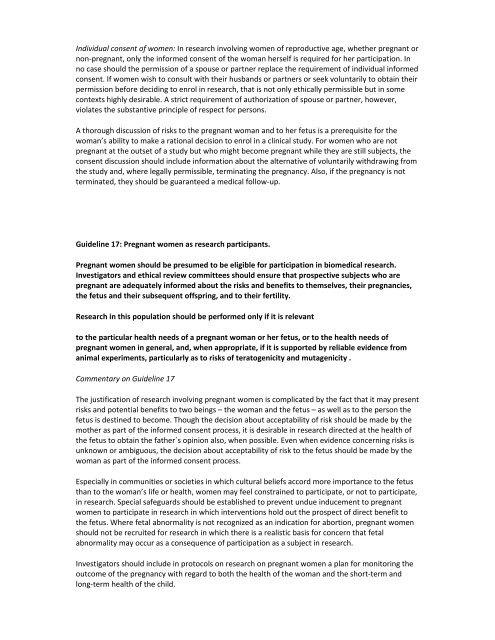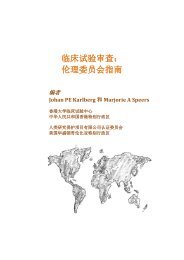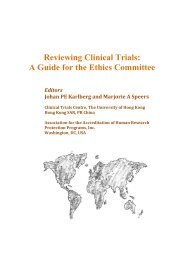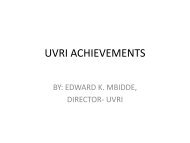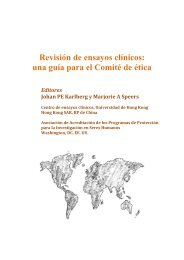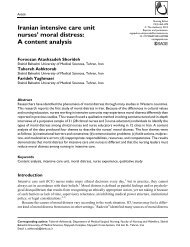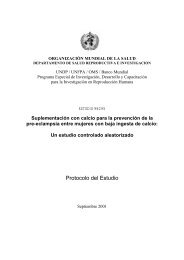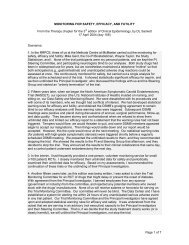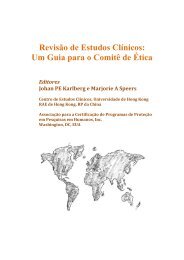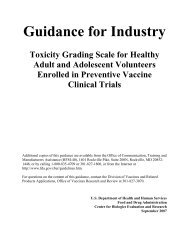CIOMS Guidelines - Global Health Trials
CIOMS Guidelines - Global Health Trials
CIOMS Guidelines - Global Health Trials
- No tags were found...
You also want an ePaper? Increase the reach of your titles
YUMPU automatically turns print PDFs into web optimized ePapers that Google loves.
Individual consent of women: In research involving women of reproductive age, whether pregnant ornon-pregnant, only the informed consent of the woman herself is required for her participation. Inno case should the permission of a spouse or partner replace the requirement of individual informedconsent. If women wish to consult with their husbands or partners or seek voluntarily to obtain theirpermission before deciding to enrol in research, that is not only ethically permissible but in somecontexts highly desirable. A strict requirement of authorization of spouse or partner, however,violates the substantive principle of respect for persons.A thorough discussion of risks to the pregnant woman and to her fetus is a prerequisite for thewoman’s ability to make a rational decision to enrol in a clinical study. For women who are notpregnant at the outset of a study but who might become pregnant while they are still subjects, theconsent discussion should include information about the alternative of voluntarily withdrawing fromthe study and, where legally permissible, terminating the pregnancy. Also, if the pregnancy is notterminated, they should be guaranteed a medical follow-up.Guideline 17: Pregnant women as research participants.Pregnant women should be presumed to be eligible for participation in biomedical research.Investigators and ethical review committees should ensure that prospective subjects who arepregnant are adequately informed about the risks and benefits to themselves, their pregnancies,the fetus and their subsequent offspring, and to their fertility.Research in this population should be performed only if it is relevantto the particular health needs of a pregnant woman or her fetus, or to the health needs ofpregnant women in general, and, when appropriate, if it is supported by reliable evidence fromanimal experiments, particularly as to risks of teratogenicity and mutagenicity .Commentary on Guideline 17The justification of research involving pregnant women is complicated by the fact that it may presentrisks and potential benefits to two beings – the woman and the fetus – as well as to the person thefetus is destined to become. Though the decision about acceptability of risk should be made by themother as part of the informed consent process, it is desirable in research directed at the health ofthe fetus to obtain the father´s opinion also, when possible. Even when evidence concerning risks isunknown or ambiguous, the decision about acceptability of risk to the fetus should be made by thewoman as part of the informed consent process.Especially in communities or societies in which cultural beliefs accord more importance to the fetusthan to the woman’s life or health, women may feel constrained to participate, or not to participate,in research. Special safeguards should be established to prevent undue inducement to pregnantwomen to participate in research in which interventions hold out the prospect of direct benefit tothe fetus. Where fetal abnormality is not recognized as an indication for abortion, pregnant womenshould not be recruited for research in which there is a realistic basis for concern that fetalabnormality may occur as a consequence of participation as a subject in research.Investigators should include in protocols on research on pregnant women a plan for monitoring theoutcome of the pregnancy with regard to both the health of the woman and the short-term andlong-term health of the child.


